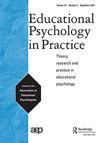Teaching children and adolescents about mental wellbeing: an exploratory multi-site case study in England
IF 1.4
Q4 PSYCHOLOGY, EDUCATIONAL
引用次数: 4
Abstract
ABSTRACT Attention on children and young people’s (CYP) wellbeing has increased internationally over the past two decades, particularly in the context of education. This small scale, preliminary study was conducted across four state-funded schools in England (two primary; two secondary) amidst a time of policy change that saw the introduction of Mental Wellbeing Support Teams in schools, and the mandating of statutory Health Education curricula. The study investigated whether psycho-informed lessons could be developed aligned to curriculum guidelines, and how pupils would engage with this learning content. Drawing on Positive Education (PE) theory, and Self-Determination theory (SDT) the researchers worked collaboratively to co-develop and deliver lessons to CYP (aged 9–11 years, and 14–15 years). This paper describes the theoretical underpinnings of the lessons, learning activities used, and critically reflects on pupils’ engagement. Implications for practice are considered and recommendations made regarding possible future teaching of mental wellbeing in England.儿童和青少年的心理健康教育:英国的一项探索性多地点案例研究
摘要在过去的二十年里,国际上对儿童和年轻人(CYP)福祉的关注有所增加,尤其是在教育方面。这项小规模的初步研究是在英格兰四所国家资助的学校(两所小学;两所中学)进行的,当时正值政策变化时期,学校引入了心理健康支持团队,并强制实施了法定的健康教育课程。这项研究调查了心理知情课程是否可以根据课程指南进行开发,以及学生将如何参与这些学习内容。根据积极教育(PE)理论和自我决定理论(SDT),研究人员合作共同开发CYP(9-11岁和14-15岁)并为其授课。本文描述了课程的理论基础、所使用的学习活动,并批判性地反思了学生的参与度。考虑了对实践的影响,并就英国未来可能的心理健康教学提出了建议。
本文章由计算机程序翻译,如有差异,请以英文原文为准。
求助全文
约1分钟内获得全文
求助全文

 求助内容:
求助内容: 应助结果提醒方式:
应助结果提醒方式:


